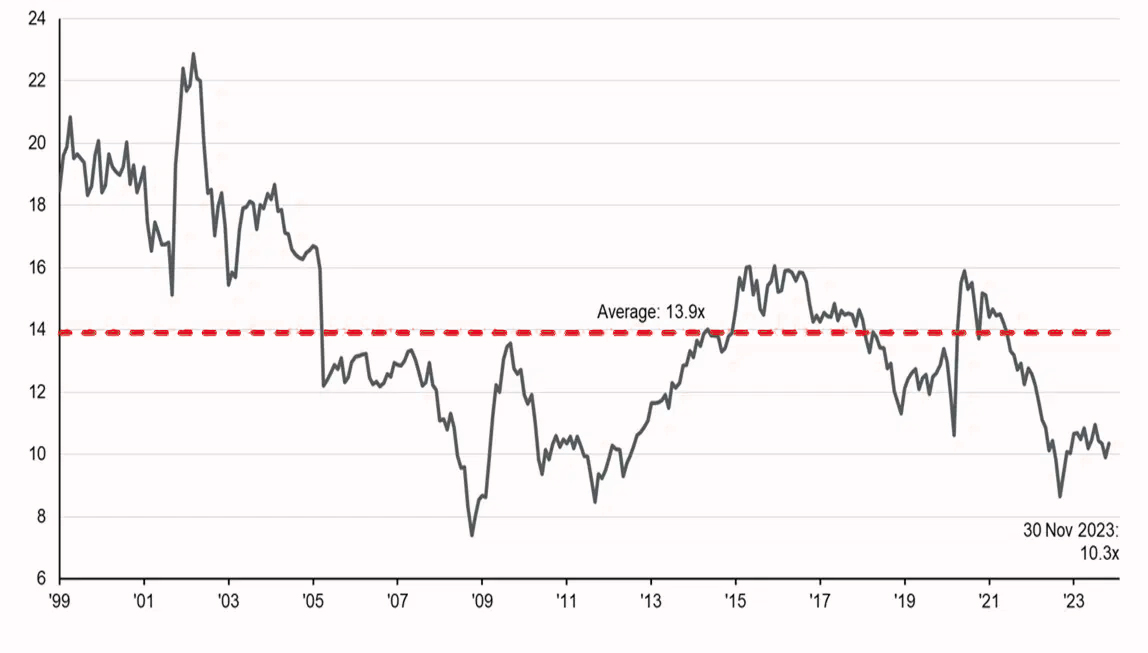A couple of weeks ago, State of Play looked at how shares in the US were performing, with a particular focus on the Magnificent Seven stocks (see here). This week, we go closer to home and take a look at UK shares. With UK shares currently struggling when compared to their US counterparts, what does the future hold?
Are UK shares cheap?
The UK saw alarmingly high inflation in 2022 and 2023, prompting the Bank of England (BoE) to implement a series of interest rate hikes aimed at reducing inflation and slowing down the economy. As a result, investor and consumer confidence plummeted as borrowing and the cost of goods both skyrocketed. However, the UK economy managed to hold up fairly well last year, outperforming most forecasts and avoiding a recession.
There now appears to be some light at the end of the tunnel; inflation has started to decline and interest rates are forecast to be cut in the second half of 2024. Despite these positives, UK share growth has remained stagnant, while shares overseas are now reaching new highs.1
Does this mean that UK shares have become cheap or simply reflect the market’s expectations of lower company earnings?
Why are they cheap?
The price of a share tells you how much people are willing to pay to own it, but what is known as the Price-to-Earnings ratio (P/E) is a metric which tells you whether the price of the share accurately reflects the company’s earnings potential, or it’s value over time. The lower the number, the better the value. For UK shares, this ratio has averaged 141 since 2000, it had fallen to around 8 in 2022 and is currently around 12.1 The P/E ratio for US shares is currently around 222, which is 10 times more than the current ratio for UK shares.
UK FTSE All-Share P/E Ratio

Source: Finimize, 7 December 2023. Past performance is not a guide to future performance.
One reason for this fall was that investors started to lose interest in the UK market, leading to the price of these shares declining. With attention focused on rising inflation and interest rates during 2022 and 2023, many investors sold their UK shares and took advantage of investing in cash savings accounts that now offer higher interest when compared to the previous 10 years. Net outflows (money that has been withdrawn) from UK shares were around £15 billion in 2022 and £13 billion in 2023.3
This combined with the impact of low productivity and political uncertainty made UK shares less attractive to buyers.
With interest rates now expected to fall in 20244, will UK shares see a resurgence?
Catalysts for UK shares
Although it has been a tough period for UK shares, there are some positives that could increase demand for UK shares:
- Lower-priced UK companies make them more attractive as potential takeover opportunities.5
The improving certainty over interest rates and the low valuations are likely to make UK companies more attractive to buyers. This could come in the form of a takeover by another UK company (for example, proposed takeover of UK housebuilder Redrow by Barratt6) or by overseas companies taking advantage of lower valuations. - UK companies are not dependent on the growth of the UK economy.
UK companies provide investors with exposure to global economies. The largest 100 UK companies (known as the FTSE 100) are estimated to earn over 80% of their revenues overseas, it is over 50% for the next 250 biggest companies (known as the FTSE 250).7 This means that low economic growth in the UK will not impact these company shares as much as you may think, investors in these shares will be more concerned about global economic growth. - Cheaper access to overseas economic growth
UK shares are typically cheaper than some other markets such as US shares8 and this gap has increased further.
The value of seeking guidance and advice
It is important to seek advice and guidance from a professional financial adviser who can help to explain how to build an appropriate financial plan to match your time horizons, financial ambitions and risk comfort. If you already have a plan in place or have already invested, it is important to allocate time to review this to ensure this remains on track and appropriate for your needs.

Investing can feel complex and overwhelming, but our educational insights can help you cut through the noise. Learn more about the Principles of Investing here.
Note: Data as at 8 February 2024. 1Finimize, 7 December 2023. 2YCharts, 7 February 2024. 3Morningstar, 30 January 2024. 4Bank of England, 1 February 2024. 5Peel Hunt, 31 January 2024. 6The Guardian, 7 February 2024. 7FTSE Russell, 7 February 2024. 8Fathom Consulting, 7 February 2024.
Important information
For retail distribution.
This document has been approved and issued by Santander Asset Management UK Limited (SAM UK). This document is for information purposes only and does not constitute an offer or solicitation to buy or sell any securities or other financial instruments, or to provide investment advice or services. Opinions expressed within this document, if any, are current opinions as of the date stated and do not constitute investment or any other advice; the views are subject to change and do not necessarily reflect the views of Santander Asset Management as a whole or any part thereof. While we try and take every care over the information in this document, we cannot accept any responsibility for mistakes and missing information that may be presented.
The value of investments and any income is not guaranteed and can go down as well as up and may be affected by exchange rate fluctuations. This means that an investor may not get back the amount invested. Past performance is not a guide to future performance.
All information is sourced, issued, and approved by Santander Asset Management UK Limited (Company Registration No. SC106669). Registered in Scotland at 287 St Vincent Street, Glasgow G2 5NB, United Kingdom. Authorised and regulated by the FCA. FCA registered number 122491. You can check this on the Financial Services Register by visiting the FCA’s website www.fca.org.uk/register.
Santander and the flame logo are registered trademarks.www.santanderassetmanagement.co.uk





